

Share
28th October 2022
01:01am BST

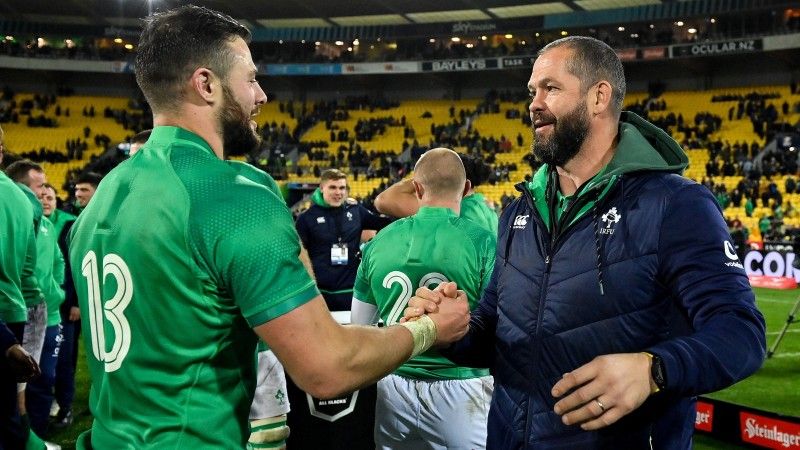 Ireland head coach Andy Farrell and Robbie Henshaw after their side's victory in the Steinlager Series against the All Blacksd. (Photo by Brendan Moran/Sportsfile)[/caption]
Ireland head coach Andy Farrell and Robbie Henshaw after their side's victory in the Steinlager Series against the All Blacksd. (Photo by Brendan Moran/Sportsfile)[/caption]
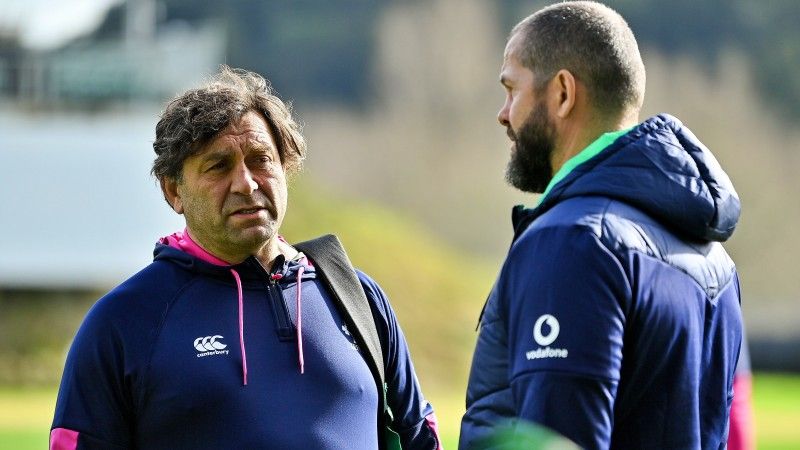 IRFU performance director David Nucifora, left, with head coach Andy Farrell during Ireland rugby squad training at North Harbour Stadium in Auckland. (Photo by Brendan Moran/Sportsfile)[/caption]
Q: How solid is Irish rugby, in a financial sense...
I can't give you numbers. There's probably a financial result coming out some time soon. All I can say is we've gone through an unbelievable period that Covid has imposed on sport and society, and we've come out the other end. Not only have we come out the other end and we're still here and reasonably strong, but throughout that period we've also managed to maintain the momentum in our game, in our model, of player production and player performance.
So once again I think that happens because a lot of people contribute to the decision making and the structure of what goes on, on and off the field. So I’d rather be in our shoes than a lot of other of our competitors’ shoes.
Q: Men’s Sevens getting a boost to their contracts as well?
Yeah, that whole programme got recalibrated so the men’s, the women’s programmes, sevens, 15s, men’s sevens and the women’s programme all got recalibrated. They’re on exactly the same model.
Q: How big a boost is that?
I think it’s a significant boost for them. A lot of those players have been giving everything they’ve got in the professional training environment on very small amounts of money for a long time. I see things written about cost of living and other things in Ireland, those players have been doing it for a long time.
I’m not saying that that’s right or good, I’m saying they’ve done it and I think sometimes we also need to stop and think about what Olympic athletes do. When you look at the model in Ireland and what our Olympic athletes here get and what they do, you know, they exist on… they would kill for the money that’s being offered to our players at the moment and they live and train full-time.
Sometimes we lose a bit of context with how we think about things. We’re not saying it’s perfect but it’s better and we’ve said all along we’ll try and keep getting better at what we can provide for them. And I think where we’ve gotten to at the moment is a reasonable point.
As I said, 15 to 30 grand is not a lot of money but it will enable them to train full time and the bonus structures and everything else, so if you’re a top-tier player and you’re on the top end of that you’d probably earn yourself 45,000 in a year if you do well and be successful in teams.
So that compares pretty well across the board in a lot of areas, certainly in sport, certainly in amateur sport with our Olympic sports and certainly if you’re comparing around the world with rugby contracts, it’s a reasonable effort.
[caption id="attachment_256350" align="aligncenter" width="800"]
IRFU performance director David Nucifora, left, with head coach Andy Farrell during Ireland rugby squad training at North Harbour Stadium in Auckland. (Photo by Brendan Moran/Sportsfile)[/caption]
Q: How solid is Irish rugby, in a financial sense...
I can't give you numbers. There's probably a financial result coming out some time soon. All I can say is we've gone through an unbelievable period that Covid has imposed on sport and society, and we've come out the other end. Not only have we come out the other end and we're still here and reasonably strong, but throughout that period we've also managed to maintain the momentum in our game, in our model, of player production and player performance.
So once again I think that happens because a lot of people contribute to the decision making and the structure of what goes on, on and off the field. So I’d rather be in our shoes than a lot of other of our competitors’ shoes.
Q: Men’s Sevens getting a boost to their contracts as well?
Yeah, that whole programme got recalibrated so the men’s, the women’s programmes, sevens, 15s, men’s sevens and the women’s programme all got recalibrated. They’re on exactly the same model.
Q: How big a boost is that?
I think it’s a significant boost for them. A lot of those players have been giving everything they’ve got in the professional training environment on very small amounts of money for a long time. I see things written about cost of living and other things in Ireland, those players have been doing it for a long time.
I’m not saying that that’s right or good, I’m saying they’ve done it and I think sometimes we also need to stop and think about what Olympic athletes do. When you look at the model in Ireland and what our Olympic athletes here get and what they do, you know, they exist on… they would kill for the money that’s being offered to our players at the moment and they live and train full-time.
Sometimes we lose a bit of context with how we think about things. We’re not saying it’s perfect but it’s better and we’ve said all along we’ll try and keep getting better at what we can provide for them. And I think where we’ve gotten to at the moment is a reasonable point.
As I said, 15 to 30 grand is not a lot of money but it will enable them to train full time and the bonus structures and everything else, so if you’re a top-tier player and you’re on the top end of that you’d probably earn yourself 45,000 in a year if you do well and be successful in teams.
So that compares pretty well across the board in a lot of areas, certainly in sport, certainly in amateur sport with our Olympic sports and certainly if you’re comparing around the world with rugby contracts, it’s a reasonable effort.
[caption id="attachment_256350" align="aligncenter" width="800"]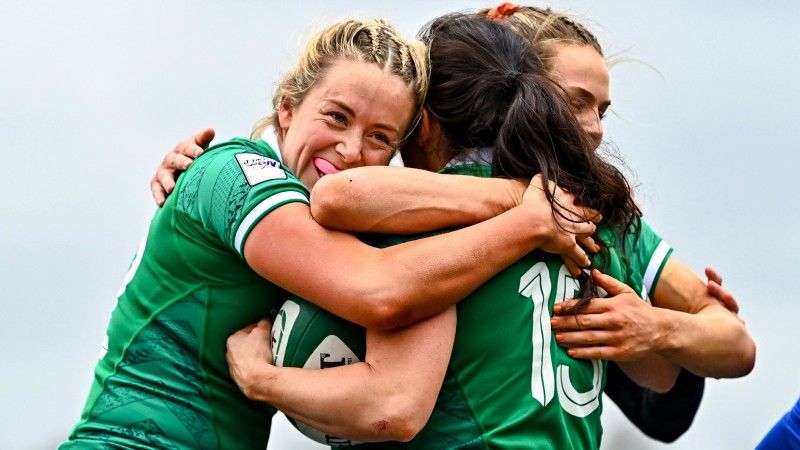 Lucy Mulhall of Ireland, centre, celebrates with teammates Stacey Flood, left, and Dorothy Wall. (Photo by Eóin Noonan/Sportsfile)[/caption]
Q: What does it say though if you compare the best women to the men, very different games and models, but what message does it send to a 10-year-old kid - the best men’s players in the country are earning 10 times more than the best female players?
I’m not sure how I answer that. I mean, I think we all understand the model. We’ve started from nothing. The game’s still being built. We’ve got to make sure, we talk about sustainability but you just have to look over to England and what’s happening, you know, we’ve got to be smart about what we’re doing.
A few people that have been around these shores a lot longer than me gave me a lesson of back in 1995 when the men transitioned into full-time statues and a few of the people I work with now where in that space of having decisions to make about ‘do I stay with my career or do I go professional' and back then going professional was nothing like it is now, it was nothing like that.”
A few of the people I work with now where in that space of having to make decisions about 'Do I stay in my career or do I go professional?' and back then going professional was nothing like it is now, it was nothing like that.But we feel the model now in place will accelerate the players that are able to take up the offer to go full time and the model would enable them over time, you would think, encourage others to take up that option if that's what they want to do. If it's their choice to be the best rugby player that they can be, then they've got the ability to do that. They will be financially supported to a reasonable level and as we've shown over time with our Sevens programmes etcetera, we've started with nothing and now it has grown and grown over the years. So look, it's not perfect but it's going to give people options. If that's their choice to do that, they've got it, if it's their choice to do their career and still play and be supported, they've got it. At the same time we're investing in that infrastructure in the women’s game, not exactly the same but similar, to suit the women's game to grow that and we're dealing with competition structures.
So over time with the women's game, we'll get there, I think we've shown that we've got the ability to be creative and grow and understand how you build something. This is going to take a bit of time and those that can afford or want to stay in the game at least have the option to.
Q: How much of a risk is it for those who take hybrid option and aren't in full time, regarding them falling down the pecking order?
How big a risk is it? Well you'd think over time they will fall behind and I day that because I'd back our full time programme to be pretty good and over time you'd have that expectation. But in saying that, the opportunity for that person to be able to work, play rugby and get supported, that's challenging but it's nothing different to what our Olympic athletes do, I keep coming back to that.
They have that choice. See, we've tried to create a model of choice and it was never going to be perfect and it was never going to suit everyone but there is a number of different parts to it that give people choice and I think that was the best we could do to be able to put it together in that manner.
So no-one will be penalised for being or not being anywhere but it will all come down to what it always comes back down to, and that's performance.
Q: How convinced are you that the provincial model can work for the women's game?
Well I didn't say it would be the provincial model, I did say our ambition would be to get to four teams. Maybe it will be the provincial model, maybe it won't be, maybe it will be four teams based....we're talking five years, potentially, down the track. It might be the four provinces but it might be something else. The big thing is that we have a performance competition.
When you look around the world at how the different women's competitions, like the women's AFL or women's rugby league in Australia and how it's grown with the way the teams have increased over time, that's been done to try and keep the performance levels up whilst we grow the game and try and get some development pathways so we have more teams at a reasonable level.
Lucy Mulhall of Ireland, centre, celebrates with teammates Stacey Flood, left, and Dorothy Wall. (Photo by Eóin Noonan/Sportsfile)[/caption]
Q: What does it say though if you compare the best women to the men, very different games and models, but what message does it send to a 10-year-old kid - the best men’s players in the country are earning 10 times more than the best female players?
I’m not sure how I answer that. I mean, I think we all understand the model. We’ve started from nothing. The game’s still being built. We’ve got to make sure, we talk about sustainability but you just have to look over to England and what’s happening, you know, we’ve got to be smart about what we’re doing.
A few people that have been around these shores a lot longer than me gave me a lesson of back in 1995 when the men transitioned into full-time statues and a few of the people I work with now where in that space of having decisions to make about ‘do I stay with my career or do I go professional' and back then going professional was nothing like it is now, it was nothing like that.”
A few of the people I work with now where in that space of having to make decisions about 'Do I stay in my career or do I go professional?' and back then going professional was nothing like it is now, it was nothing like that.But we feel the model now in place will accelerate the players that are able to take up the offer to go full time and the model would enable them over time, you would think, encourage others to take up that option if that's what they want to do. If it's their choice to be the best rugby player that they can be, then they've got the ability to do that. They will be financially supported to a reasonable level and as we've shown over time with our Sevens programmes etcetera, we've started with nothing and now it has grown and grown over the years. So look, it's not perfect but it's going to give people options. If that's their choice to do that, they've got it, if it's their choice to do their career and still play and be supported, they've got it. At the same time we're investing in that infrastructure in the women’s game, not exactly the same but similar, to suit the women's game to grow that and we're dealing with competition structures.
So over time with the women's game, we'll get there, I think we've shown that we've got the ability to be creative and grow and understand how you build something. This is going to take a bit of time and those that can afford or want to stay in the game at least have the option to.
Q: How much of a risk is it for those who take hybrid option and aren't in full time, regarding them falling down the pecking order?
How big a risk is it? Well you'd think over time they will fall behind and I day that because I'd back our full time programme to be pretty good and over time you'd have that expectation. But in saying that, the opportunity for that person to be able to work, play rugby and get supported, that's challenging but it's nothing different to what our Olympic athletes do, I keep coming back to that.
They have that choice. See, we've tried to create a model of choice and it was never going to be perfect and it was never going to suit everyone but there is a number of different parts to it that give people choice and I think that was the best we could do to be able to put it together in that manner.
So no-one will be penalised for being or not being anywhere but it will all come down to what it always comes back down to, and that's performance.
Q: How convinced are you that the provincial model can work for the women's game?
Well I didn't say it would be the provincial model, I did say our ambition would be to get to four teams. Maybe it will be the provincial model, maybe it won't be, maybe it will be four teams based....we're talking five years, potentially, down the track. It might be the four provinces but it might be something else. The big thing is that we have a performance competition.
When you look around the world at how the different women's competitions, like the women's AFL or women's rugby league in Australia and how it's grown with the way the teams have increased over time, that's been done to try and keep the performance levels up whilst we grow the game and try and get some development pathways so we have more teams at a reasonable level.
I don't see this as being any different to that, so the biggest thing for me is the effort we put into the base of the game.
If we ignore that, and I know all the focus is on the top of the game, but for me the most important element of the women's game is the growth of what sits underneath it. That's going to involve... there's a report coming out soon, but a lot of that will focus on the participation, access to the game, competition structures - that's where the real difference is going to be made.
If you want to have four teams, six teams we'd be doing really well - who knows? If we don't get that right, nothing is sustainable.
[caption id="attachment_187126" align="aligncenter" width="647"]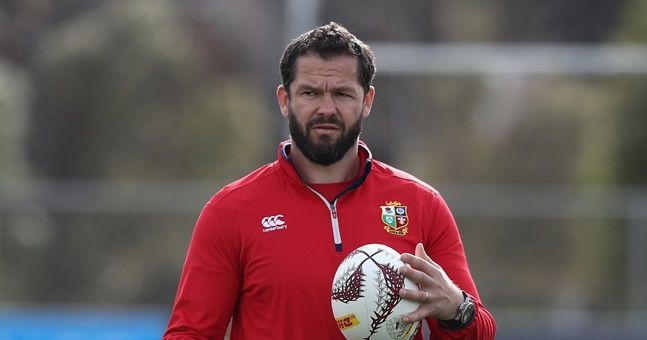 Andy Farrell was the Lions' defence coach for the 2017 tour to New Zealand. (Photo by David Rogers/Getty Images)[/caption]
Andy Farrell was the Lions' defence coach for the 2017 tour to New Zealand. (Photo by David Rogers/Getty Images)[/caption]
Q: With the contract of Andy Farrell extended up to 2025, does that leave him open to get involved with the Lions?
We've done it in such a way to have another couple of years of continuity.
It does tie in with a Lions year and we'd be ecstatic if Andy was the Lions coach, we think that that would be fantastic. If he gets offered that job and chooses to take it, we'd be fully supportive of him because for us that's part of the growth of the game here.
So, there are things that would be assessed along the way. We feel that we've got a world class head coach, a really good coaching ticket that supports him and we'll be working to try and secure them for as long as we can."
Q: Martin Anayi of the URC spoke of a 'Next Gen' competition. Would the IRFU have much say in that? When you say Next Gen, he is referring to this cup competition, I think it is for one year. With the URC finishing in May and not resuming until later in the year, but later than normal. I know they were looking at, ‘how do we fill this gap’ from a competition point of view. We’ll wait and see what they put on the table. Basically it will be for the teams that don’t have access to World Cup players, it will be a competition for them to play in. Now, I haven’t heard any more than that, to potentially fill that space for one year. Q: How important will the club-game be, in terms of men's and women's rugby, in the coming years? It is what it is now. Like, I mean, it will always have a purpose because it houses a lot of younger players to be able to give them that game time. I mean, it sits in that pathway, and serves that pathway now for developing players through that NTS academy space and they go back and they get it, a good chunk of their game time in that. Realistically do I see that massive evolution of the role of the club game is going to change if looking five years, 10 years down the road? I don’t. None of them will like that, because historically it has had an elevated importance going back a number of years now. But it will always have an important role, it just won’t be at the elevated level as it was before the provinces. That’s not demeaning it in any way, it’s just a fact. It’s part of life and things roll on and things change. But it’s important, it plays a huge role in the success that we have had in that pathway space and what it does for those young guys. And we desperately want to keep it healthy. Q: Does the proposed Nations League mean an end of multi-Test tours? Look, there has been a lot of work done, I’ve been doing this a long time and I’ve been listening to conversations about a global calendars now for ten or 15 years. And we get close, and it falls over. So there is nothing agreed yet, the concepts are there, and the concepts are on the table at the moment seem to have the most legs, is one that would see tours not happen every summer, but they could still happen every second year. And obviously you’ve got a World Cup in one of those years, and a Lions year in the other year, so they wouldn’t be full blown tours for us for example. But there is still opportunities to work on touring. The competition structures would change in the other two years, it will involve, they are keen on creating a competition structure between north and south and it would involve playing one-off games down in the southern hemisphere, three games down in the south in the June and the windows, sort of have gone around the full circle and got back to where we started, which was okay we’re going to play three games in July and three or four in November and at the end of that you’ll have a winner. So that’s probably what it is, you might get seven games, that sounds incredibly simple but to get to that point of agreement on structure, finance, everything else, is unbelievably complicated, broadcast deals etc etc. There is a lot to happen yet before I think we get to that next stage, but certainly, a lot of time and effort went on in there. [caption id="attachment_155427" align="aligncenter" width="647"]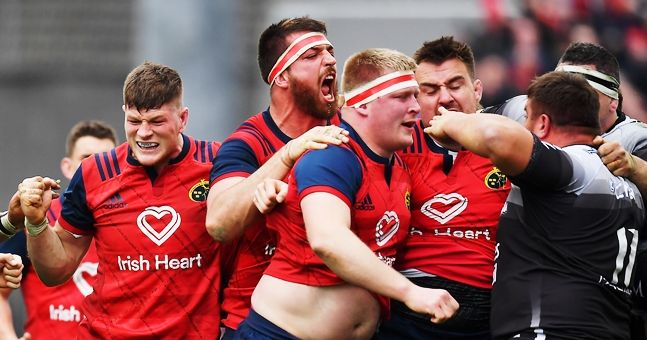 Prop John Ryan is returning to Munster, from Wasps, on as short-term deal.[/caption]
Q: Any more signings from Worcester or Wasps?
We're having trouble finding space for the players we have now for game-time, obviously for injuries you've seen Oli Morris, who came through our IQ system and played U20s and went to Munster on a short-term contract, John Ryan's come back from Wasps to cover an injury down there. Sutherland, again it's a short-term thing. There are some short-term requirements out there but we're pretty healthy.
If you look at the number of foreigners in our system it's diminished down the years and it's enabled Irish players dominate the space which has been great, but if there are Irish eligible players out there, like a couple of those guys are, we'd always try help those guys out first.
Q: For the women's contracts - what other sporting models did ye look at around the world? Players groups consulted?
We looked globally, as you can imagine there are a number of countries that have the same conundrum of how we make this work. There is a lot of consultation between people doing my sort of roles around the world, swapping ideas, sop we have a very good understanding of all the models and how they work.
Are we the only ones in the world with challenges in this space? No, we're not, but we're all working, trying to help each other where we can to come up with outcomes and trying to grow the game, but grow it in a responsible way, and a sustainable way.
Q: Does game need to diversify? It is still dominated by Dublin schools...
I don't disagree, we're always trying to get the game into more areas. I think it's the opportunity for growth in that space, a lot of the players are coming through some of those development programmes, a lot of those boys are from outside of that area [Dublin schools]. We've got to keep getting better at understanding what talent is, and how we can develop talent.
I think there's a lot more talent out there, we've got to apply that to the women's game because we obviously don't have that feeder system in the women's game and once again for us to be able to go out there and get the best athletes in the country playing the game of rugby, we've to be smart about how we do that....
“I think there’s a lot more talent out there. We’ve got to apply that to the women’s game because obviously, we don’t have that feeder system in the women’s game. For us to be able to go out there and get the best athletes in the country playing the game of rugby, we’ve got to be smart about how we do that. They’re some of the things that we’ve looked at in this report that will come out.
One of the tools we’ve got to go out there and attract young women into the game of rugby, how do we do it, what do the competition structures look like, what are the formats that we use, how do we create competitions that are meaningful and sustainable for young women to play in? I suggest that we’re going to learn a lot about what we should do in the men’s game from how we create growth in the women’s game. Some of those things will be applied to the men’s game, so we’ve just got to keep thinking outside the box around how we keep growing and evolving.”
[caption id="attachment_250864" align="aligncenter" width="800"]
Prop John Ryan is returning to Munster, from Wasps, on as short-term deal.[/caption]
Q: Any more signings from Worcester or Wasps?
We're having trouble finding space for the players we have now for game-time, obviously for injuries you've seen Oli Morris, who came through our IQ system and played U20s and went to Munster on a short-term contract, John Ryan's come back from Wasps to cover an injury down there. Sutherland, again it's a short-term thing. There are some short-term requirements out there but we're pretty healthy.
If you look at the number of foreigners in our system it's diminished down the years and it's enabled Irish players dominate the space which has been great, but if there are Irish eligible players out there, like a couple of those guys are, we'd always try help those guys out first.
Q: For the women's contracts - what other sporting models did ye look at around the world? Players groups consulted?
We looked globally, as you can imagine there are a number of countries that have the same conundrum of how we make this work. There is a lot of consultation between people doing my sort of roles around the world, swapping ideas, sop we have a very good understanding of all the models and how they work.
Are we the only ones in the world with challenges in this space? No, we're not, but we're all working, trying to help each other where we can to come up with outcomes and trying to grow the game, but grow it in a responsible way, and a sustainable way.
Q: Does game need to diversify? It is still dominated by Dublin schools...
I don't disagree, we're always trying to get the game into more areas. I think it's the opportunity for growth in that space, a lot of the players are coming through some of those development programmes, a lot of those boys are from outside of that area [Dublin schools]. We've got to keep getting better at understanding what talent is, and how we can develop talent.
I think there's a lot more talent out there, we've got to apply that to the women's game because we obviously don't have that feeder system in the women's game and once again for us to be able to go out there and get the best athletes in the country playing the game of rugby, we've to be smart about how we do that....
“I think there’s a lot more talent out there. We’ve got to apply that to the women’s game because obviously, we don’t have that feeder system in the women’s game. For us to be able to go out there and get the best athletes in the country playing the game of rugby, we’ve got to be smart about how we do that. They’re some of the things that we’ve looked at in this report that will come out.
One of the tools we’ve got to go out there and attract young women into the game of rugby, how do we do it, what do the competition structures look like, what are the formats that we use, how do we create competitions that are meaningful and sustainable for young women to play in? I suggest that we’re going to learn a lot about what we should do in the men’s game from how we create growth in the women’s game. Some of those things will be applied to the men’s game, so we’ve just got to keep thinking outside the box around how we keep growing and evolving.”
[caption id="attachment_250864" align="aligncenter" width="800"]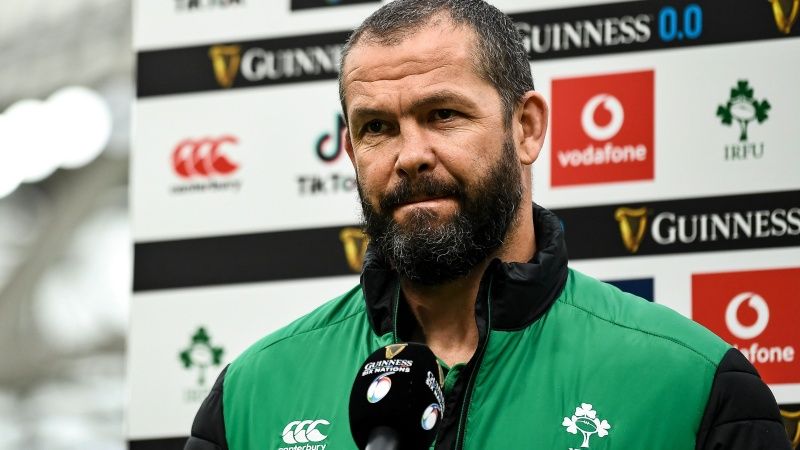 Ireland head coach Andy Farrell is interviewed before a Six Nations match against Wales. (Photo by Harry Murphy/Sportsfile)[/caption]
Was there interest in Andy Farrell from elsewhere? How sought after was he?
The coaching market these days works years in advance, that’s one of the things that has changed over the last few years. Coaches are being chased a long way out. That didn’t influence what we did. We had the agreement with Andy Farrell before we went to New Zealand, it just wasn’t made public. That’s how confident we are that we’ve got the best coach.
We’ll see what happens going forward about whether he becomes the Lions coach or not but I think you can’t help but be impressed with what he’s done with the team and how he manages the team. I supposed you’ve always got to fight hard when you’ve got something that’s good because we operate in a global market and there’s always pressure on people wanting to take your best assets. That won’t change.
The Ireland assistant coaches? Important to keep that team together?
It’s important but again, everyone has different decisions to make based on different things in life. Their job is only one of them. Look, I would be confident that we will retain that group but I couldn’t guarantee you that at the moment. And if that didn’t happen, would I be worried about that? I would be disappointed but I wouldn’t be worried. One of the benefits of having a really robust system is that everyone’s really curious about what we’re doing and how we’re doing it. Because they’re curious, when we put an ad in the paper for whatever – a nutritionist, a physio, a coach – the change in the last five years about the global interest in wanting to work in this system is enormous.
So people want to be a part of this at the moment because they think we’re doing it OK. In the same way you guys have written about Stuart [Lancaster] going away over to Racing, there will be plenty of people wanting to get in that space. Why? Because it’s successful, they see it as a good system, a good model. You’re not short of applicants when that happens and that’s the benefit of the whole system doing well.
I said right at the start, this isn’t built on one or two people. That number I gave you for people working in the pathway, it’s built on a lot of good people doing good work. A lot of those people at that level are busting to get into the system and working the system. There’s all sorts of benefits from a bit of sustainable success. We’ve got to harness that and keep it going. If we don’t and it falls off, you’ve got to build it again. A long answer to your question, but I think there will always be good people wanting those positions if they came up.
They see it as a good system, a good model, so you’re not short of applicants when that happens and that’s one of the benefits of the whole model doing well.
I said right at the start, this isn’t built on one or two people. That number I gave you about people working in the pathway it’s built on a lot of people and a lot of good people doing good work, and a lot of those people doing good work at that level are people that are busing to get into the system and work in the system.
So there are all sorts of side benefits from a bit of sustainable success and we’ve just got to harness that and keep it going, because if you don’t and it falls off then you’ve got to rebuilt it again.
So it’s a long answer to your question but I think there’ll always be good people wanting those positions if they come up.
Are the people currently within the system that if someone does decide to move on there is a readymade replacement within your system?
I think there’s plenty of people who could swap jobs and work up, yeah. I think there’s a lot of guys that could step and do different roles. That’s another really good space to be in.
Just on that coaching front, we’ve got Noel McNamara down in South Africa at the moment and he’s out there learning a lot about different aspects of the game down in the southern hemisphere. We’re about to send one of other young developing coaches down to Super Rugby. That deal is almost finalised now as well. There’s a lot going on in that space too about how we keep developing Irish coaches into different areas.
[caption id="attachment_252217" align="aligncenter" width="800"]
Ireland head coach Andy Farrell is interviewed before a Six Nations match against Wales. (Photo by Harry Murphy/Sportsfile)[/caption]
Was there interest in Andy Farrell from elsewhere? How sought after was he?
The coaching market these days works years in advance, that’s one of the things that has changed over the last few years. Coaches are being chased a long way out. That didn’t influence what we did. We had the agreement with Andy Farrell before we went to New Zealand, it just wasn’t made public. That’s how confident we are that we’ve got the best coach.
We’ll see what happens going forward about whether he becomes the Lions coach or not but I think you can’t help but be impressed with what he’s done with the team and how he manages the team. I supposed you’ve always got to fight hard when you’ve got something that’s good because we operate in a global market and there’s always pressure on people wanting to take your best assets. That won’t change.
The Ireland assistant coaches? Important to keep that team together?
It’s important but again, everyone has different decisions to make based on different things in life. Their job is only one of them. Look, I would be confident that we will retain that group but I couldn’t guarantee you that at the moment. And if that didn’t happen, would I be worried about that? I would be disappointed but I wouldn’t be worried. One of the benefits of having a really robust system is that everyone’s really curious about what we’re doing and how we’re doing it. Because they’re curious, when we put an ad in the paper for whatever – a nutritionist, a physio, a coach – the change in the last five years about the global interest in wanting to work in this system is enormous.
So people want to be a part of this at the moment because they think we’re doing it OK. In the same way you guys have written about Stuart [Lancaster] going away over to Racing, there will be plenty of people wanting to get in that space. Why? Because it’s successful, they see it as a good system, a good model. You’re not short of applicants when that happens and that’s the benefit of the whole system doing well.
I said right at the start, this isn’t built on one or two people. That number I gave you for people working in the pathway, it’s built on a lot of good people doing good work. A lot of those people at that level are busting to get into the system and working the system. There’s all sorts of benefits from a bit of sustainable success. We’ve got to harness that and keep it going. If we don’t and it falls off, you’ve got to build it again. A long answer to your question, but I think there will always be good people wanting those positions if they came up.
They see it as a good system, a good model, so you’re not short of applicants when that happens and that’s one of the benefits of the whole model doing well.
I said right at the start, this isn’t built on one or two people. That number I gave you about people working in the pathway it’s built on a lot of people and a lot of good people doing good work, and a lot of those people doing good work at that level are people that are busing to get into the system and work in the system.
So there are all sorts of side benefits from a bit of sustainable success and we’ve just got to harness that and keep it going, because if you don’t and it falls off then you’ve got to rebuilt it again.
So it’s a long answer to your question but I think there’ll always be good people wanting those positions if they come up.
Are the people currently within the system that if someone does decide to move on there is a readymade replacement within your system?
I think there’s plenty of people who could swap jobs and work up, yeah. I think there’s a lot of guys that could step and do different roles. That’s another really good space to be in.
Just on that coaching front, we’ve got Noel McNamara down in South Africa at the moment and he’s out there learning a lot about different aspects of the game down in the southern hemisphere. We’re about to send one of other young developing coaches down to Super Rugby. That deal is almost finalised now as well. There’s a lot going on in that space too about how we keep developing Irish coaches into different areas.
[caption id="attachment_252217" align="aligncenter" width="800"]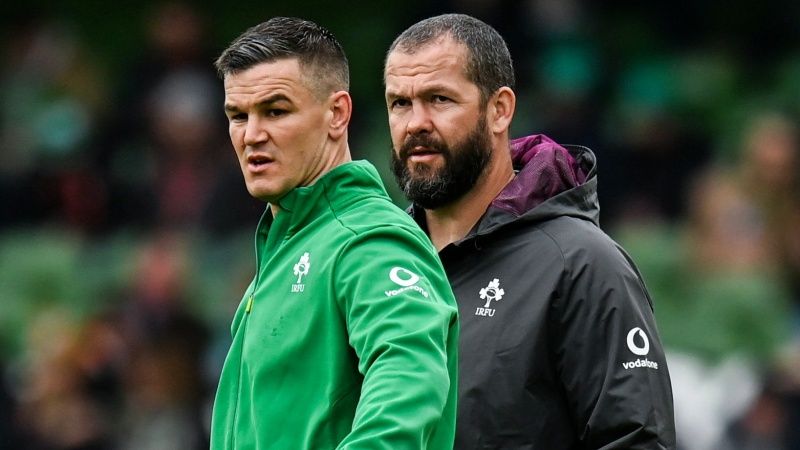 Ireland captain Jonathan Sexton and head coach Andy Farrell. (Photo by Harry Murphy/Sportsfile)[/caption]
Johnny Sexton still has a huge influence on group. Have you spoken to him about going one more year?
I only just spoke to him about the last one and going one more year. But, look, he’s obviously fully focussed on what’s in front of him and I wouldn’t have that conversation with him now to distract him in any way, shape or form. So, he’ll make a decision.
We’ve said all along, because we’ve gone in short bites with him over the last couple of years, that it was a strategy that he and I agreed on, to say; ‘Righto, let’s just see how it goes, see how you feel, see what your body is like, see how you’re playing’. I think that’s actually suited him, to take a bit of pressure off in the fact that he’s comfortable with where he’s at, and that’s been reflected in how he's playing.”
Are you a bit worried, post World Cup, that if he does go he’ll leave such a huge void?
I’m not worried about it. I’d have a lot of confidence in the young fellas that are there or thereabouts. At some point in time you do have to get time in the saddle in that position. Test matches aren’t a place to experiment with at times, because the pressure is on all the time to win. So it’s a tough job to be able to juggle that.
Yes, we’re conscious of it but I suppose I’d go back to what I was saying before about how we work with the provinces, what we do in finding game time and opportunities for some of the other talent and how that all works.
But there’s enough talent there when they get the chance and the opportunity to step up. It wont be the same, it will be different, but we’ve definitely got the talent.
[caption id="attachment_256529" align="aligncenter" width="800"]
Ireland captain Jonathan Sexton and head coach Andy Farrell. (Photo by Harry Murphy/Sportsfile)[/caption]
Johnny Sexton still has a huge influence on group. Have you spoken to him about going one more year?
I only just spoke to him about the last one and going one more year. But, look, he’s obviously fully focussed on what’s in front of him and I wouldn’t have that conversation with him now to distract him in any way, shape or form. So, he’ll make a decision.
We’ve said all along, because we’ve gone in short bites with him over the last couple of years, that it was a strategy that he and I agreed on, to say; ‘Righto, let’s just see how it goes, see how you feel, see what your body is like, see how you’re playing’. I think that’s actually suited him, to take a bit of pressure off in the fact that he’s comfortable with where he’s at, and that’s been reflected in how he's playing.”
Are you a bit worried, post World Cup, that if he does go he’ll leave such a huge void?
I’m not worried about it. I’d have a lot of confidence in the young fellas that are there or thereabouts. At some point in time you do have to get time in the saddle in that position. Test matches aren’t a place to experiment with at times, because the pressure is on all the time to win. So it’s a tough job to be able to juggle that.
Yes, we’re conscious of it but I suppose I’d go back to what I was saying before about how we work with the provinces, what we do in finding game time and opportunities for some of the other talent and how that all works.
But there’s enough talent there when they get the chance and the opportunity to step up. It wont be the same, it will be different, but we’ve definitely got the talent.
[caption id="attachment_256529" align="aligncenter" width="800"]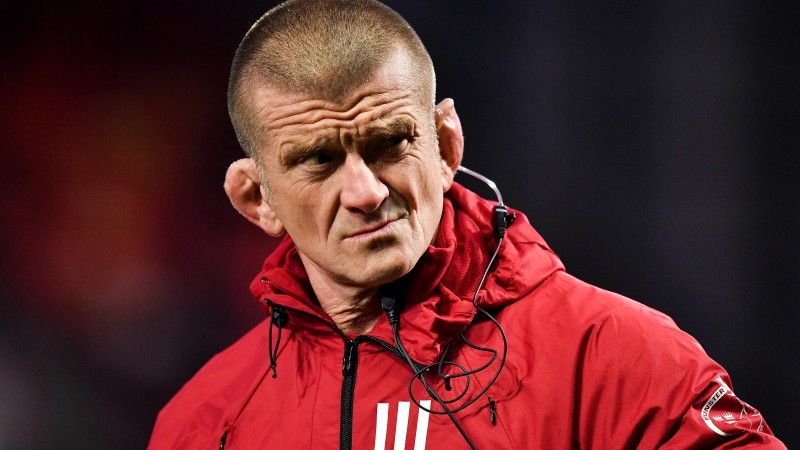 Munster head coach Graham Rowntree. (Photo by Brendan Moran/Sportsfile)[/caption]
Q: Emerging Ireland tour, and putting huge emphasis on expanding the pool of players, and what players fit in to various situations, and the robust conversations you talked about with the provinces, do you run the risk of potentially having difficulties retaining or attracting the best coaches around, considering the reach you have on those players in the provinces. A coach might be worried about the autonomy he’ll have?
Munster head coach Graham Rowntree. (Photo by Brendan Moran/Sportsfile)[/caption]
Q: Emerging Ireland tour, and putting huge emphasis on expanding the pool of players, and what players fit in to various situations, and the robust conversations you talked about with the provinces, do you run the risk of potentially having difficulties retaining or attracting the best coaches around, considering the reach you have on those players in the provinces. A coach might be worried about the autonomy he’ll have?
I don't think so... don't misunderstand the autonomy that they have currently to do what they want. They're supported significantly through the Irish model, bit it financially and the way its contracted and everything else, so they have a lot of stability that English clubs don't have because of the way the model works.
I'm sure there are days where they don't want to be part of the IRFU, when they want to run their own race in totality, but I bet you there's more days when they're more comfortable being where they are now. I don't think, in the here and now, that that's a risk at all. It think because we've got four really strong Irish teams that we're ever going to be in a position that I can foresee at the moment if we keep doing our job well that people won't want to be part of the system.
You come into this model with your eyes open too so for the guys that are foreign coaches who come into it, they understand that ok this is how we work here. If you don't want to be a part of it then you don't have to come, you don't have to put your hand up for the job, but if you're an Irish coach, you fully understand and I think you take that on board.
There are days when it works in your favour and there are days when you'd say, jeez I wish it was a bit different. I think the issue of being part of the system although there are more days when they're happy as opposed to the other.
Fifth province project to fill void potentially left by Welsh team in the URC in the years to come?
I haven't heard that, but I don't... gosh.. imagine setting up a fifth province. Yeah, I hadn't heard that so I don't really know how feasible that is but...
Or a team in the Premiership, partnership over there?
Yeah, look, I think down the track you've got to look at everything. Some of them are obviously more feasible than others and there's a financial attachment to it.
It's not cheap to run one of these professional teams. I think at the moment, four teams, it works, but we've probably got to be smarter with how we work with the four teams...
Does it rule out that you'll never have a fifth team? I don't think so. You've got to keep that on the table, but at the moment I think you've got to look at the model and how that can be adapted and manipulated because everything we do has to be financially sustainable as well - and that's the other part as well. The alignment that we get out of the Irish model is its aligned and it gives you operational sustainability but it also gives you financial sustainability and that always has to be top of the list.
We've got to be able to afford what we do.
Munster concerns?
Look, they've got enough quality players down there. They'll get it moving in the right direction. There's lots of times when they look back over the years and where teams have had tricky periods and they've bounced back.
I've got total confidence that the players and the coaches down there will do exactly that. They'll start to get their rhythm, they'll start to get a better understanding of how the coaches want them to play and they'll get back into it.
Explore more on these topics: